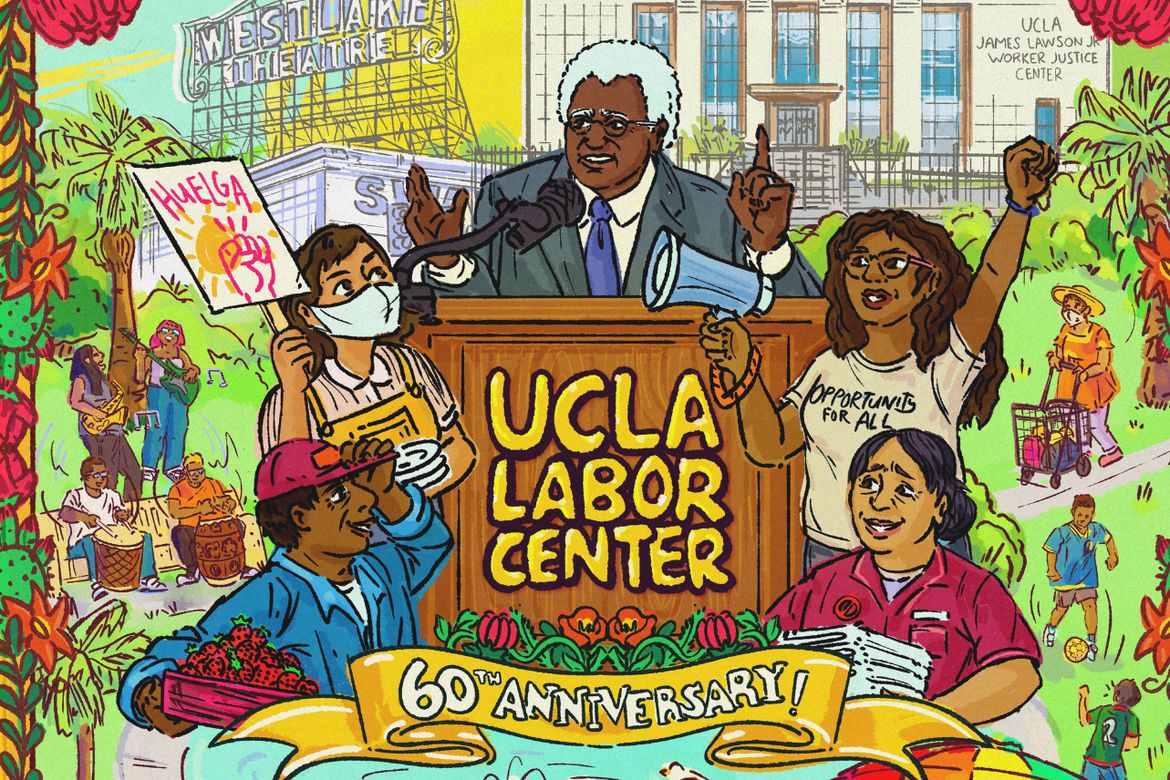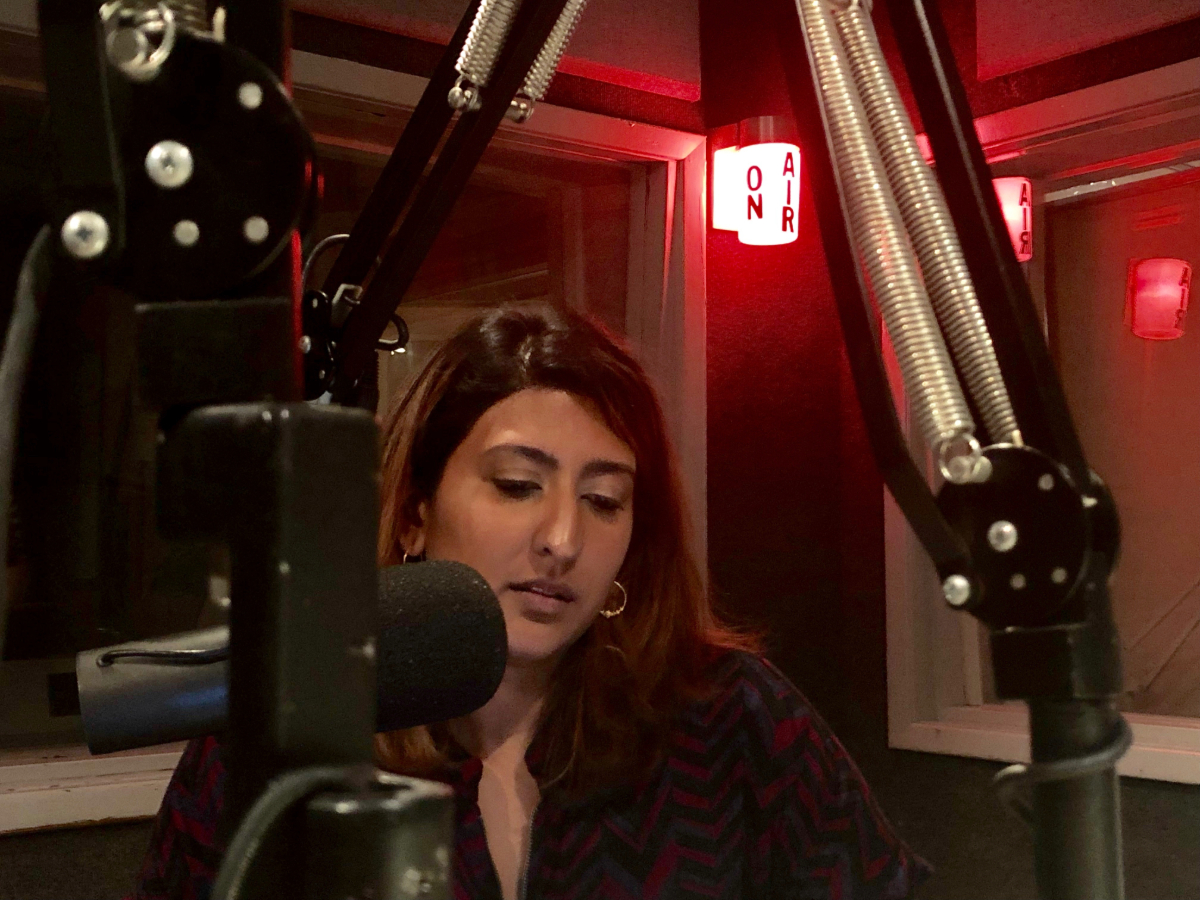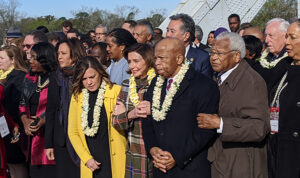Co-producer Veena Hampapur discusses the project presented by Re:Work, the center’s women-led podcast

For six decades, the UCLA Labor Center has served as a labor research engine and educational pathway behind some of the city’s and state’s most innovative labor policies, and its approaches are often cited as a model of what is possible when data is guided by worker and community needs.
In 2009, for example, the Labor Center incubated the nation’s first Black Worker Center to increase access to quality jobs and to reduce employment discrimination, led at the time by now state Sen. Lola Smallwood-Cuevas. In 2013, the center’s landmark study helped coin the term “wage theft,” which led to the establishment the Office of Wage Standards in the City of Los Angeles; and more recently, on the heels of the COVID-19 pandemic, its fast-food worker study led to the creation of the first-ever fast food state council in the country.
Established in 1964 as the Center for Labor Research and Education within the UCLA Institute of Industrial Relations — now the UCLA Institute for Research on Labor and Employment, or “IRLE” — by a statewide joint labor-university committee, the Labor Center was created to foster collaboration between academia and labor unions to address the issues facing unions at the time — job displacement, long work hours and unemployment. In 2001, the center opened a downtown location in a historic building, recently named in honor of labor and civil rights icon the Rev. James Lawson Jr. The strategic expansion aimed to deepen the center’s ties to local unions and worker centers and to better address the needs of low-wage workers living and working miles away from UCLA’s Westwood campus. The center’s experts engage with local, regional, national and international print and digital news media on timely labor topics and analysis.
Throughout its history, the center has uplifted the voices of workers whose identities and experiences were previously ignored or devalued.
“Too often the story we hear about Los Angeles centers on the beauty, glamour and comfort; less often do we hear about the workers who make all of this possible,” said Tobias Higbie, labor historian and IRLE’s director. “The Labor Center has always told a different story: that contemporary L.A. is the product of struggle — sometimes the daily struggle of workers to survive and build community, and sometimes the dramatic struggle of public protest.”
Through its women-led podcast, Re:Work, the center elevates stories that humanize and break down economic and racial justice issues. Each episode presents the life story of a worker or activist through curated interviews, punctuated by host reflections, layered sound design and archival recordings that draw listeners to a particular time, place and feeling, creating a deeply immersive experience for listeners.
Re:Work recently released a special mixtape that celebrates the center’s educational goals, its transformative work and what lies ahead. The creative force behind the podcast’s distinct sound is Veena Hampapur, Re:Work’s co-producer. Hampapur, who earned her doctorate in sociocultural anthropology from UCLA in 2016 and has a background in filmmaking, got involved with UCLA’s Center for EthnoCommunications and the Center for Oral History Research as a student, building experiences which continue to influence her approach to interviewing and storytelling.
She often wished she could share the ideas and research she learned in her classes and fieldwork with a wider audience. Now, through Re:Work, she’s curating interviews that bring labor research and social science to life. Hampapur discusses Re:Work’s history, the mixtape’s curatorial process and how “narrative change” helps to change the public discourse around workers, unions and industries.
This interview has been edited for length and clarity.
To begin, tell me a bit about the history of Re:Work and how it came to the UCLA Labor Center.
Re:Work originated in 2013 from a KPFK radio show called “Labor Review,” which was hosted for over 19 years by a lifelong community activist named Henry Walton. Henry wanted to retire, so he passed the show on to Saba Waheed, our Labor Center director, who was research director at that time, and Stefanie Ritoper, who was the director of communications.
I joined the show in 2018 and cherish the opportunity it has provided me to tap into many aspects of my academic background and the capacity for deep listening I’ve cultivated as a parent of two young children. I draw from all of these experiences to grow our narrative change work.
Can you talk about how Re:Work contributes to the Labor Center’s “narrative change” mission around worker issues?
People process the world through stories, and though it sounds counterintuitive, the more specific you get in storytelling, the more universal a story feels. At the Labor Center we work with issues that are often misunderstood, controversial and jargony. So through Re:Work, we use storytelling to build bridges — to break down social justice issues in an accessible way, and to recognize and process the complexities of the people and world around us. We see the podcast as an opportunity to build connection, empathy and awareness through in-depth storytelling, which is at the heart of our narrative change work.
Why do you think audio presents a good opportunity to unpack worker issues and struggles?
We live in a time of a 24-hour news cycle, ever-present social media and growing misinformation. In contrast, audio offers an intimate and compelling experience of connecting with another person’s story and emotions. There’s something visceral about hearing another person’s voice in your headphones. With longform storytelling, there’s a unique opportunity to go in depth, which allows you to really connect and empathize with another person’s perspective and experiences, even if their life and feelings may be different from your own.
The Labor Center is celebrating its 60th anniversary. Why opt for a mixtape to mark this milestone?
When I think about a mixtape, it has a fun nostalgia to it. With mixtapes, or mixes you made on CDs growing up, it was a gift you made for someone else. So this is our gift, from the Labor Center to our partners, our supporters, our friends, our allies. And I think mixtapes also say something about who you are.
Tell me more about that. What do these tracks say about the UCLA Labor Center?
Our mixtape includes a diversity of voices and a diversity of Labor Center projects, and in each episode we try to present our guests holistically and intersectionally. So I think you learn a lot about our work and our values, what it is that we care about and whose voices we want to uplift. We’re trying to uplift worker agency and activism. And hopefully it contributes to a sense of hope for communities coming together.

What is in the mixtape?
The first section is all historical. The mixtape starts off with us talking about the (center’s) 60th anniversary, where we’ve been as a Labor Center, and where we’re going. There’s a few episodes with Reverend Lawson and Henry Walton — people we have lost but whose memories and teachings we carry on.
There are a couple episodes with staff who shaped the Labor Center. We have a “Labor Studies 101” track from our IRLE archives featuring our IRLE director Tobias Higbie talking to our previous Labor Center director, Kent Wong, about L.A. labor history.
We have a conversation from a little over 10 years ago about Black and immigrant communities, which features our former CARE at Work director and now-state Senator Lola Smallwood-Cuevas. (CARE stands for the Center for the Advancement of Racial Equity.)
What comes next?
From there we shift to stories from immigrant and low-wage workers before moving on to young worker stories, including an international story from a migrant worker in India during the pandemic.
How does the mixtape conclude?
We end the tape with stories from women of color in L.A. who talk about work as a “calling” and pivoting careers once they became parents. They both pay homage to previous generations who helped pave their paths.
The mixtape starts with inspirational words from Lawson, and ends on an inspirational note with “Radical Therapy,” which focuses on how to take care of your emotional well-being while doing social justice work.
How do you recommend listeners dive into the mixtape?
On the mixtape, each track is a full Re:Work episode. The tape is available on Spotify, YouTube, Soundcloud and also on the Labor Center and Re:Work’s websites. Join the celebration by putting on your earbuds and doing some deep listening with us.
The Re:Work 60th Anniversary Mixtape begins with “A Beautiful Kind of Foundation.”



